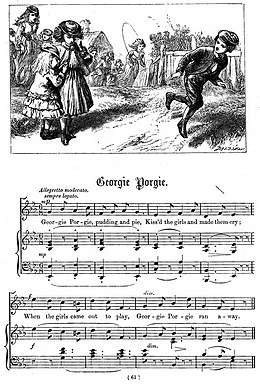Georgie Porgie
"Georgie Porgie" is a popular English language nursery rhyme. It has a Roud Folk Song Index number of 19532.

Lyrics
Originally the lyrics were:
- Georgie Porgie, pudding and pie,
- Kissed the girls and made them cry,
- When the girls came out to play,
- Georgie Porgie ran away.
However, at the start of the 20th century the third line was often changed to refer to boys.
Origins and variations
The earliest printed appearance of the rhyme was in The Kentish Coronal (1841), where it was described as an "old ballad" with the name spelled "Georgy Peorgy".[1] This version was later illustrated by Kate Greenaway in 1881,[2] and a Cheshire dialect version was quoted in 1887 with the variant "picklety pie" in place of "pudding and pie".[3]
James Orchard Halliwell did not record the words in his collection of The nursery rhymes of England, but in the fifth edition of 1853 he included a variant:
- Rowley Powley, pumpkin pie,
- Kissed the girls and made them cry;
- When the girls begin to cry,
- Rowley Powley runs away.[4]
Among children the verse has been used as a rhyming taunt for boys called George, or else of fat boys. It is also used to harass a boy who is considered not sufficiently manly, either because he is thought to fancy a girl, or (with a switch of sexes in line two) who is accused of being homosexually inclined.[5] It can also be used to tease a girl who fancies a boy, where, with other appropriate changes, she is addressed as "Rosie Posie".[6]
Peter and Iona Opie mention various conjectures that link the character Georgie Porgie to British historical figures, including King George I and George Villiers, 1st Duke of Buckingham, but without the slightest evidence,[7] and such unsubstantiated claims have been copied in other works of reference to this day.
Musical versions
The rhyme was included in National Nursery Rhymes (London, 1870), a volume illustrated by George Dalziel and Edward Dalziel, where the words were set to music by James William Elliott.[8] And in 1885 they were set as a part song by the Canadian composer Joseph Gould under his musical pseudonym, Spencer Percival.[9][10]
References
- The Kentish coronal, original prose and poetry by persons connected with the county of Kent, ed. by H.G. Adams, p.44
- Barbara A. Kissinger, Mother Goose of Yesteryear, Pelican 2008, p.21
- Thomas Darlington, The Folk-speech of South Cheshire, English Dialect Society (1887), p.12
- Section 14, Love and Matrimony, rhyme 488, p.248
- N. G. N. Kelsey, Games, Rhymes, and Wordplay of London Children, Palgrave Macmillan 2019, pp.501-2
- I. Kroupova, IS MU diploma thesis 2015, p.10
- The Oxford Dictionary of Nursery Rhymes (Oxford University Press, 2nd edition, 1997), pp.185–6
- Online copy available at the University of Florida, p.61
- The score is preserved at McGill University
- A modern performance on Good Night, Good Night, Beloved! and other Victorian part songs, Atma Classique 2012